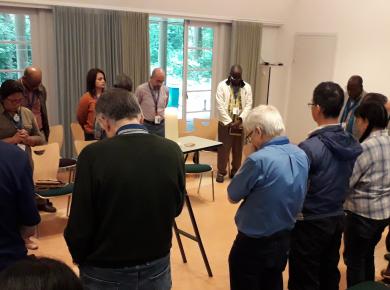Posted: August 27, 2019
Like the chambers of a heart, the four MWC commissions serve the global community of Anabaptist-related churches, in the areas of deacons, faith and life, peace, mission. Commissions prepare materials for consideration by the General Council, give guidance and propose resources to member churches, and facilitate MWC-related networks or fellowships working together on matters of common interest and focus. In the following, one of the commissions shares a message from their ministry focus.
Right relationships lie at the heart of biblical peace or shalom. Peace is not simply a state of being or a tranquil place. Rather shalom arises when we relate to one another, with creation, and with God rightly. It emerges out of relationships. It is a process, not a place.
For example, Psalm 34:14b encourages us to “seek peace, and pursue it….” It’s not just about finding peace. We must actively seek it out. This happens when we “depart from evil and do good” (Psalm 34:14a).
We’re given the impression that peace might not be easy to achieve. But the demand is unequivocal – we must chase it!
Second, Psalm 85:10 says: “Steadfast love and faithfulness will meet; righteousness and peace will kiss each other.” Without justice (in Greek, the same word as righteousness) there will be no peace. Put differently, justice is an essential element in peace.
And third, James 3:18: “And a harvest of righteousness is sown in peace for those who make peace.” The way one plants matters. Interestingly, in this case, the fruit does not match the seed planted. The fruit of righteousness (or justice; these two are variations of the same word) comes from the way in which the seed is sown.
Just as justice is essential for peace, James suggests that the pursuit of justice must be done in peace for a fruit of righteousness to emerge.
Unfortunately, a quick glance through news articles highlights the fact that the world is not at peace. There is unrest as people come together to challenge the way in which their governing authorities are ruling; wars and violent conflicts endure; poverty and economic instability and exploitation continue to sow hopelessness, exacerbating scarcity.
These realities show that people around the world are not experiencing peace that includes justice. Recognizing this lack of peace helps to understand why people feel the need to migrate.
The reality of migration touches us all: we may be the ones on the move, we may be supporting those who are on the move, or we may be the ones who benefit from the systems that cause people to take a perilous journey toward a more hopeful and dignified life.
News broadcasters and leaders too often describe this as an “immigration crisis.” Such a depiction, however, fails to recognize the injustice from which people want to escape. In other words, we fail to understand why people choose the dangerous journey to leave home in search of peace; we fail to recognize the forces that cause inhumane, undignified, and/or violent realities people seek to escape.
As Christians we are confronted with the reality that the one whom we follow – Jesus – was himself an immigrant and refugee. His parents fled the threat of death from Herod.
Forces of death continue to pursue people today. And as followers of the refugee Jesus, we too should be concerned in how to help others. In helping those who are fleeing, we help the Jesus who also was forced to flee!
The Peace Commission seeks to walk with, support, and animate ways in which our member churches embody Christ’s peace in and for our world. This means finding ways to respond to the mechanisms of death that grip many around the world. It also means exploring how we might – consciously or unconsciously – participate in forces of injustice, oppression, exploitation, and violence toward our own brothers and sisters.
To this end, the Peace Commission has been involved in:
- Children on the move. MWC has been part of a global faith consortium to help children who are migrating, and to mobilize faith communities to be centres of support.
- Working with our Indigenous brothers and sisters. Our most recent document, “Declaration of Solidarity with Indigenous Peoples,” approved in 2018, has been a helpful tool for our churches to explore, confess and seek to repair the way in which our own history of migration has also caused, created, or perpetuated new forms of injustice. We continue to pursue more just and restorative relationships with our Indigenous brothers and sisters.
- Conscientious Objection. We support our member churches whose governments require their young people to serve in the military. By request from our churches who struggle with this reality, we are drafting a document regarding Conscientious Objection that our churches can use in their particular struggles with their governing authorities.
As a global communion that values life and living in right relationship with one another, with creation, and with God (i.e., shalom), we inevitably become involved in challenging forces of death. We recognize our culpability in such forces, but also seek to work toward life. This is a large and daunting task!
As the Peace Commission, our hope is to support our churches throughout the world pursuing peace with justice while stepping out of the cycle of violence that inevitably perpetuates death. In this way, we can hopefully demonstrate Christ’s way of peace through our witness of being pilgrims on a journey that transcends borders.
May God grant us the strength and courage to continue on this journey.
—A Mennonite World Conference release by Andrew Suderman, secretary of the Peace Commission. He serves as Assistant Professor in theology, peace, and mission at Eastern Mennonite University, Harrisonburg, Virginia.

Comments: